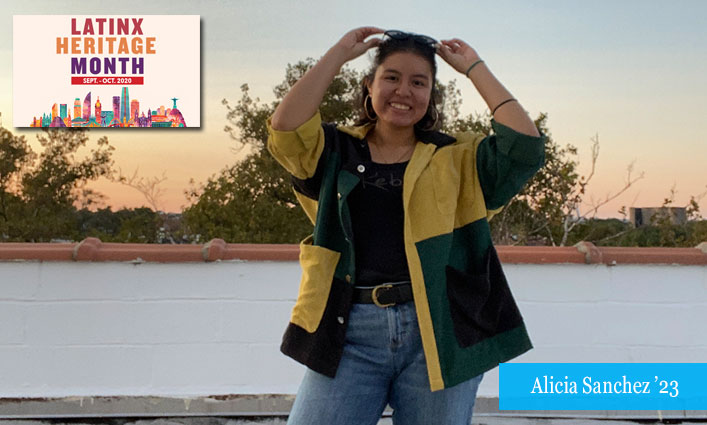
In honor of Latinx Heritage Month, John Jay College—a Hispanic-Serving Institution—is proudly celebrating the many ways in which Latinx people have enriched our country. As part of our “Latinx Celebration” series, we sat down with a talented group of ¡Adelante! students to learn more about their Latinx identity, what this celebration means to them, who in the Latinx community inspires them, and why they are hopeful for the future of Latinx communities.
Alicia Sanchez ’23, a Political Science major from Queens, New York, is proud of her mixed Mexican and Ecuadorian roots. “My father is from Mexico and my mother is from Ecuador, and while I’ve never been able to visit my parents’ home countries, I’m still incredibly proud of where I come from, my family’s story, and history,” says Sanchez. “I know what courage and tenacity look like. Their story inspires me every day.” Wanting to deepen her connection to her ancestry, Sanchez is learning more about the diversity in the Latinx community. And, she’s gaining greater insight on Latinx history at John Jay, where she’s minoring in Latin American and Latinx Studies. “Latinx people are a mix of Spanish, African, and Indigenous ancestry, and that’s worth embracing. There’s so much we don’t know about Latinx history in this country. In school, you don’t learn the history of Latinx countries or Latinx people in the U.S. What I’m learning at John Jay about our history has truly been eye-opening.”
“In school, you don’t learn the history of Latinx countries or Latinx people in the U.S. What I’m learning at John Jay about our history has truly been eye-opening.” —Alicia Sanchez
Why is it important to celebrate Latinx Heritage Month?
To me, it’s important to celebrate Latinx Heritage Month because it’s a way of educating the American public on our history, our culture, and all the good we bring to the table. The term Latinx is so diverse, encompassing so many cultures and people. It’s an opportunity to honor and celebrate that diversity.
What does it mean to you to go to a Hispanic-Serving Institution? How does going to a Hispanic-Serving Institution make you feel?
Growing up, I didn’t feel like I had safe spaces in the academic world where I could just be me. Sometimes, the public education system can make you feel like being different makes you an “other.” But, coming to John Jay and seeing all the different nationalities and ethnicities represented, makes you feel like you belong. I’m really proud to be at a Hispanic-Serving Institution like John Jay. It shows that our people want to earn their degrees and pursue their dreams.
“Sometimes, the public education system can make you feel like being different makes you an ‘other.’ But, coming to John Jay and seeing all the different nationalities and ethnicities represented, makes you feel like you belong.” —Alicia Sanchez
What have you learned about Latinx culture or history that surprised you?
Before John Jay, I didn’t realize how Latinx history is so intertwined with American history. When I started taking classes with the Latin American and Latinx Studies department, I learned about pre-colonial, colonial, and post-colonial America and one thing that really surprised me is the role of U.S. foreign policy in Latin America. During the 20th century, the U.S. intervened in Latin America time and time again. Sometimes using military force, at times igniting war and inciting civil wars in Latin American countries. That’s why immigration from Latin American countries increased during the end of the 20th century. It’s surprising that this isn’t taught in U.S. history classes when it is in fact part of U.S. history.
What do you hope to see for the future of the Latinx community?
One thing the Black Lives Matter protest really highlighted for me is how racism and colorism exist in Latin American countries and within our own people. I hope to see more compassion and understanding within the Latinx community. I want to see Latinx people embrace their diverse heritage and ancestry. It’s important to remember that we don’t only have Spanish ancestors. We have indigenous and African ancestors as well. Latinos are a mixed heritage ethnicity. We should take great pride in that.
“I want to see Latinx people embrace their diverse heritage and ancestry. It’s important to remember that we don’t only have Spanish ancestors. We have indigenous and African ancestors as well.” —Alicia Sanchez
How do you personally embrace your Latinx culture?
I try to maintain a connection with my Mexican and Ecuadorian roots by listening to music. My taste is a little old school. I like ’90s and early 2000s Spanish rock like Mana. I also stay connected by watching the news, keeping up with what’s going on over in Mexico and Ecuador, and within the community here, like what’s happening in terms of Covid-19 rates, Census participation, and voter registration. And, I read books by Latinx authors. One book I’d recommend is Sabrina and Corina by Kali Fajardo-Anstein. It’s about Latinas of indigenous descent in Colorado.
If you could meet any Latinx thought leader, visionary artist, educator, politician, cultural icon, or any person in history, who would it be and why?
I love to sing, so I would definitely want to meet the legendary Cuban singer Celia Cruz. She was a woman who broke musical barriers and societal barriers. She embraced and celebrated her Afro-Cuban roots, and put that into her music. I love her salsa music.
Finish this sentence: I’m proud of my Latinx heritage because…
I’m proud of my Latinx heritage because it’s made me who I am today. I’m immensely proud of my family’s story and look forward to seeing all the things that the Latinx will accomplish in the future.



